Issue Number 38, Fall 2017
Contents
- Solace by Linda Benninghoff
- last place you look by Dan Jacoby
- old game trail by Dan Jacoby
- Things with Wings by Laurette Folk
- At Split Rock by Richard Sederstrom
- The Skull by Sydney Doyle
- Unto the Heavens these Canada Geese by Diane Sahms-Guarnieri
- Twenty Questions by Samantha Grenrock
- Manhattan Remembered by JP Allen
- What the Cat Taught Me by Richard Anderson
- Potatoes by Patricia Zylius
- Rivervale by Dion O'Reilly
- Tentative Passage by CB Follett
- The Last Vulture by Sharon Bangert Corcoran
- It Starts in Your Sky by Elizabeth Kuelbs
- Only Autumn by Barbara Swift Brauer
- Sturgeon by William Stratton
- Dendrology by Robert Ronnow
- Erosion Librarian by Daniel Solomon
- Ancient Forms by Ann Struthers
Archives: by Issue | by Author Name

Solace
by Linda Benninghoff
Linda lives in the Northern Long Island Watershed in back of Caumsett State Park and less than a mile from the Long Island Sound.

What's the solace of sunset,
the snaky, cathartic path of the Yuba,
that runs into the dark?
I have glutted myself with these scenes,
but the deer lift their wings
only to be shot,
the river perch wear blood red fins
on their sides, as if to mark
the deterioration of all things natural.
At the end of summer, things yellow.
The air is yellow to breathe,
and telephone wires
slice through the state park's forest,
our active enthusiasm
for building beyond our capacity.
The black-throated chickadee
sings a song of sorrow,
and as we pick lettuce
from our dry garden
we think her song is for us.
© Linda Benninghoff

last place you look
by Dan Jacoby
Dan's family has lived in Macoupin County, Illinois, for about 165 years. Western Mound has Bear, Lick, Hodges, and Solomon creeks emptying into Macoupin Creek which flows into the Illinois River and eventually into the Mississippi River just above Alton.

weather is changing
redwing blackbirds gone
two weeks now
hedge is losing its leaves
longer cooler nights
quieted rasping crickets
weeds stop growing
grass cutting slows down
seem to go to bed earlier
with longer cooler nights
thought turning to the past
childhood memories in the timber
along low deep quiet creek bottoms
with dad and the dogs
always seem to find things
in the last place you look
© Dan Jacoby

old game trail
by Dan Jacoby
Dan's family has lived in Macoupin County, Illinois, for about 165 years. Western Mound has Bear, Lick, Hodges, and Solomon creeks emptying into Macoupin Creek which flows into the Illinois River and eventually into the Mississippi River just above Alton.

cool fall wind ripples through hilly bean field
can just see bloody tip of the pointer’s tail
as it buggy whips chasing a frantic spinning rabbit
along the now changing autumn timberline
in a late day’s dust raised obtrusively
by modern evolution of mccormick’s harvester
I imagine sauk, fox, and pawnee hunters
tall, with long flowing black hair, covered in deer skin
padding softly, slowly, deliberately; listening
always glancing furtively back every few steps
like hungry, relentless and wary coyotes
searching for signs and scents
attempting to remain the predator
and not become the prey
great brown bears used to flourish here
in these deep dark bottoms and wind worn bluffs
even now walking amongst these ancient trees
stepping carefully as not to trip
on roots, runners and dead branches covered by the fall
I pause to listen for sounds and whispers
for the faint echoes of stoic stone age hunters, gatherers, and herders
is it hubris to somehow think I can sense their presence
in the lithe spirit and light of a late fall blue moon
some say that dogs pause to stare at things we are unable see
if we empty our minds can we acquire that ability
if only for a few moments
being alone in these woods or in ancient fertile fields
following a century old game trail
I would like to think I could
© Dan Jacoby

Things with Wings
by Laurette Folk
Laurette lives between the Bass and Danvers Rivers and walks her dog daily along the last wooded trails of Green Hill, home to foxes, coyotes, fishers, and the occasional deer.

An angel with dirty feet grabs ahold
To something in that tree
His filigree wings beat the air
He is more faint than fair
A distant cousin, perhaps, to Marquez’s
Old Man with Enormous Wings
Whom they put in a cage
And sold tickets to the pious
To gawk at and the sinners to tease.
I’m sure if I had a ladder I could climb
To him and look into his yellow
Eye and know that such angels
Have the same aches and pains
As I, the only thing separating us
Would be a height of twelve feet or more.
Lo, his wings open full on, and I swear
The world went dark for a moment,
As he fluttered, fumbled, up, up. He knew
(they all know) when you’re just too close.
Back on the north side of Green Hill,
The egrets pruned and waited for the tide
To cover the shopping cart, the bike, the cabinet
And all the things we pretend not to see
The egrets pruned and waited for the tide
To unfold in fish, the grand dame,
A river herself in curves and elegance,
Bent toward the water as if to say
What have we here? I watched the lesser
Egrets do nothing as the breeze
Excused itself from the trees.
Previously appeared in the author’s collection Totem Beasts (Big Table, 2017)
© Laurette Folk
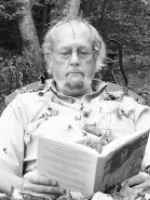
At Split Rock
for Carolyn Forché
by Richard Sederstrom
Richard was raised and lives in the North Woods of Minnesota and the Sonoran Desert of Arizona. His residences include the Mississippi, Crow Wing, and Salt River watersheds: a very big one, a very small one, and a dead-ended one, all variably enchanting and variably endangered.

You’re right about light houses, of course.
They are places of “being alone”—
under the vast refractory of prism
through prism upon prism
through year, decade, century, crush of water,
fathom upon fathom upon
the great gray ether of mud
which lies quiet,
patient while it practices to become in turn
only one among the death count of strata
that lie as layers of Earth’s calloused skin
each layer sometime exposed to the aloneness
of water working us gently warmly
away into the womb of Earth once more—
alone with the shining black orthocone
alone with mosasaur and muskelunge
with the weightless grace of a birch-bark canoe
with the Edmund Fitzgerald
with the fishing boat out there running
in a panicky straight white-knuckled
line against the waves—
with you far beyond my side
Selene’s torch searching out into the night
into the chronometer of beam timing the waves
the passage of that distant ore freighter
or the fading lights that might be anything very large
and moving very slowly
all alone, save for ourselves and all else.
Published in CLMP, "Reflections," 2013 and in the author’s book, Selenity Book Four (February 2017)
© Richard Sederstrom
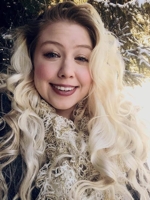
The Skull
by Sydney Doyle
Sydney was raised among the pines near the upper Delaware watershed but has since migrated, with the blue crabs and the blue herons, to the Jones Falls watershed in the Chesapeake Bay area.
I saw it one afternoon on the walk back from the school bus stop
in a spruce tree: hung among the green needles gleaming
in the sun. My father had shot a buck three nights before.
I smelled the peroxide first, then the rot
as I stared up into the dark tunnel where its nose would be,
through the crater eyes arched above, at the towering antlers,
and I touched the bones in my own face. It is strange to imagine
what is beneath one’s own skin—imagine it dissolve in my palms
as I press my hands to my face and feel where cheek-bone ends
and eye begins, and realize, for the first time, the coming emptiness inside.
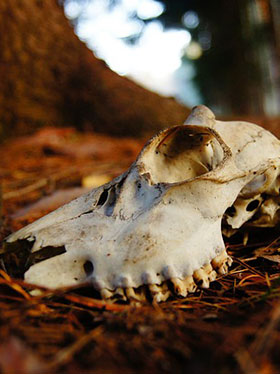
© Sydney Doyle
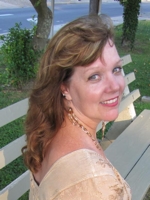
Unto the Heavens these Canada Geese
(Branta Canadensis)
by Diane Sahms-Guarnieri
Diane lives and writes poetry in Philadelphia in the Tookany-Tacony/Frankford Creek watershed. She delights in watching the return each winter of Dark-eyed Juncos to her garden and, during walks at work, the visitation of various flocks of Canada geese.

For years while passing through a field,
I watched different flocks of Canada geese
intermittently stop to rest from long migratory
flights, whereby reverently bowing the reach
of black beaks tugging at clumps of grass, often they’d
drink appreciatively from a reforming puddle.
Their webbed crisscrossing footprints
like fading fossils left imprints on my mind
holy as the presence of unseen angels.
Yet today while walking, a close-knit flock
in their nasal-tonal tribal Anserini language
honk a loud and urgent responsorial.
One goose to each of the others in the flock -
a loud honk and honk response / honk and honk response
as I stood muddled by this mystical ritual.
Relations of the Anatidae family of swans
their graceful black necks attentively raised
as if they were listening or looking
for something I could not hear or see -
Their choral leader’s croaking honk
of fog-horn urgency drew me in,
much the way a cat’s cry mimics an infant’s.
As if there is a universal cry of distress
in every language for every living creature,
and these geese soldiers stood guard
inside this landing party’s circling, constantly
responding to their tribe leader’s trembling
and agitated honk -
then like an apparition appearing from out of the heavens –
outstretched wings arriving - these two late comers – squawking loudly –
guided by the sounds of those unceasing calls
unto the heavens from lower ground,
as hang-gliders dropping
their long-legged landing gear –
release of webbed feet touching down
straight into the mist and I believe
each one’s black-beak-peck
onto another waiting goose,
a sacred kind of kiss between them
as if lost lovers reunited.
© Diane Sahms-Guarnieri
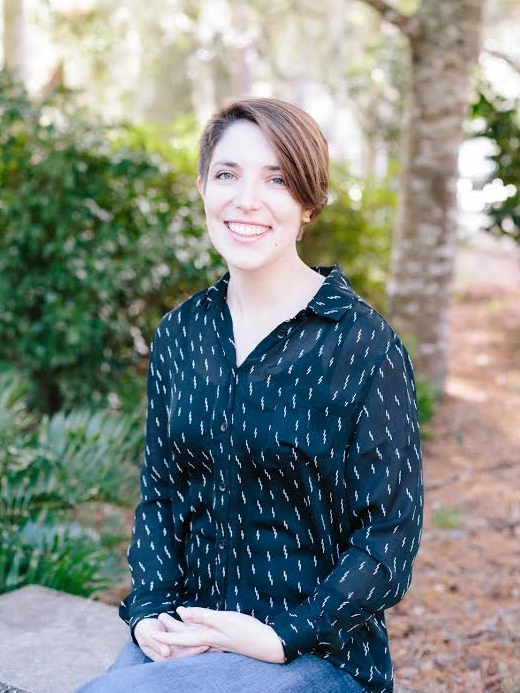
Twenty Questions
by Samantha Grenrock
Samantha lives in the Oklawaha watershed near Hogtown Creek and the Cabot-Koppers superfund site. The canopy is all banana spiders and Spanish moss.

Are you a fine line?
Are you safer than table salt?
Are you a color in the rainbow,
delivered by helicopter,
by the drum?
What is your mode of action,
metaphysical conceit?
Are you found in the pulverized heads
of chrysanthemums?
Are you pre-emergent, dosed with snow
still on the ground, not giving
the suckers a chance?
Are you shared in the colony as forage,
or do you live among them, marry their daughters?
Do you burrow down
to the imported corn borer
locked up cozily in the ear?
What is your half-life
lying low among the municipal flowerbed’s
turquoise granules, which children take
as forgotten gems?
Are you, as we’ve heard,
not a fun way to go?
Are you the independent variable,
altering tail lengths in the tadpole stage,
growing them longer, broader, the better
for evading phantoms?
Do you accumulate in predatory birds
and the Dow-Jones Industrial?
Are you cousin to sarin,
glaucoma drops, sleep aids
said to encourage lucid dreams?
Do you ring the nerve,
open the ion channel to spontaneous fire, molecular
shootout in the city
held not for infrastructure (bombed-out)
but location (strategic)?
Are you a colorless, tasteless,
trade secret dropped on the breeding ground,
thinning the jungle?
What haven’t you gotten into?
You dust the living and the still living.
© Samantha Grenrock

Manhattan Remembered
by JP Allen
JP grew up in central Kentucky's Rolling Fork watershed, where limestone soil strengthens the horses' bones. He has lived in two small landlocked towns and two coastal cities, most recently Baltimore, above the narrow valley of the Jones Falls.

The brink of autumn. The river’s rim.
Glass cliffs burn
like fountains full of flipped coins,
magic lamps
on their last wish. Window washers
hang by threads.
Twilight stays late. Every surface
flaunts its edge.
Under impending leaves, a summer
lover passes
half a heart-shaped pendant built to
crack. The curbs
teeter with hurry’s unwitting gymnasts.
Green cascades
to red. In rooftop bars, day traders
shield their eyes.
The river, gold and gray, keeps rising
inch by inch.
© JP Allen
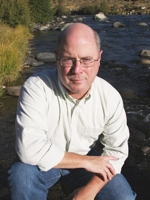
What the Cat Taught Me
by Richard Anderson
Richard lives in a town trying perhaps too hard to become a city in the middle watershed of the Truckee River.

The feral rarely speak.
It frightens food and draws
undesired attention.
Wiser simply to listen, watch.
What could be more important
than that whisp of bird song, that
slight rustling along the fence,
the immense enveloping
presence of it all.
© Richard Anderson
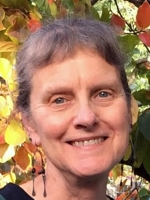
Potatoes
by Patricia Zylius
Patricia has lived in the same house in Santa Cruz, California, near the mouth of the San Lorenzo River for 47 years.

— Monsanto’s early transgenic potatoes caused severe organ damage and blood abnormalities in test rats, but Monsanto suppressed the report. Poor sales made the company quietly retire the product.
I recognize the parentage of my potatoes,
small purple fingers, marbled inside,
sweet and creamy. It’s years since I first planted
their great grandmothers. Each fall I save
a few of the most vibrant. In the spring,
winter cover crop dug in, I sow the eager tubers,
careful not to break off any shoots,
then mulch with fragrant compost.
Every generation comes up succulent and true.
When the tops have bloomed and withered,
I slip the spading fork into the ground,
lift the smooth-skinned jewels
and spread them on the path to dry
while I inhale the soil’s breath.
© Patricia Zylius
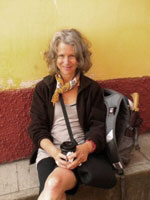
Rivervale
by Dion O'Reilly
Dion lives in the Soquel Creek watershed on a stream-cut terrace covered with a thin mantle of alluvium on a ten-acre triangular plot between Soquel Creek and its tributary, Love Creek.
We slammed doors. We set out shoeless on trails of powdery sand,
turned a corner to the river, smelled pockets of cool air rank
with black mud. Maple trees leaned in, dropped leaves that rested
like bruised hands on the skin of the water, then floated away
around the high rocks at the bend. None of our mother’s bitched-out
tasks, no sudden hands of brothers slapped away. No pimped-out
sisters or fatherless boys. No pirate-eyed stepfathers drunk
in La-Z-Boys. Gone was the stench of spilled beer and rat turds.
We learned downstream. We learned leaving. We learned someday.
Herons lifted their great bodies from the sandy streambed, shining
fish caught in their tapered beaks and the agony
twisting in the air made sense. We looked to the world
beneath the clear surface with its teeming minnows, we pushed
shin-deep through the creek, crawdads hiding, black
pincers pointing out. We snatched living food from the river—
steelhead and trout. We drank the water.
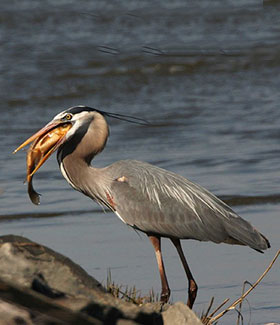
© Dion O'Reilly
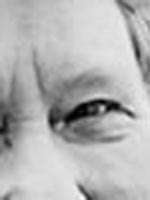
Tentative Passage
by CB Follett
CB lives in the Mt. Tamalpias watershed in Marin County, CA.

Across the highway of your brows
a tiny spider makes its way
frail legs and brown hair intermingle
as it advances its horizontal route
and I
pretending to listen to you
am caught in the web of its wake
as it stitches together your brows
creating its own intricate spanwork.
© CB Follett
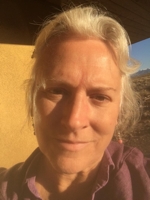
The Last Vulture
by Sharon Bangert Corcoran
Sharon lives in the San Luis Valley, at the base of the Sangre de Cristo mountain range, in the Rio Grande basin, and within sight of the Great Sand Dunes.

When the last vulture dies there will be no smell,
No one to notice her solitary rot.
Only the devas will nod in homage
To the ugly bird’s change from corpse-eater
To corpse—no one left bloody enough
To give her sky-burial.
The last vulture will die, perhaps
Of a surfeit, from a sense of duty that bade her
Eat more than she could.
When that last vulture goes to her just deserts,
There may be a straggler crow or hyena
To mop up what’s left, but she
Of the four-foot wingspan, bald head
And blood-red wattle will claim
The humble crown of the bodhisattva
Who left no one and nothing behind.
© Sharon Bangert Corcoran

It Starts in Your Sky
by Elizabeth Kuelbs
Elizabeth lives at the edge of a coyote-loud Los Angeles canyon in the Malibu Creek watershed.

We drop below your white veil and there you are all wide silver rivers and glacial milks and ready sea. Parched, we swallow and bump down arctic wind to debark in your mountain-crowned city where people tell us you are The Great Land but even we already know. Your wing, your fluke, your katabatic breaths blow back our hoods and eddy cool calls through hotel doors. In the gift shop the Dall sheep’s canvas eyes, brown, bottomless, tease us, the black bear’s carved salmon, the wolf’s stuffed ears. Come find us, they whisper, if you can. But Into the Wild? Still insane. We’d never throw our lives away like that. Then we drive out. On one side belugas spout white in the pewter inlet, on the other, moose lift their heads from lichen-filtered snowmelt, daring us to stop. Packaged, expected, we arrow on past stern eagles. We open our windows, dolphin our hands freshly, and then we begin to shrink. Your clouds sift. Your peaks sky. Your high blue ice cries rock flour. Your inlet becomes river becomes rushing aqua light. Our small fingers grasp the door handles. Spruce and birch green in. Finally we stop at your trailhead. We unzip our jackets and bounce out of our car into your forests, your fjords, your glaciers, your teeming rushing water, onto your rocky bank. We collapse on our backs, open-mouthed to falling mist and feathers, inhaling forget-me-nots. We swat white socks and pillow our heads with stones. Environment. What a paper word. Silver yourselves with mud, sing your cottonwoods. Weave fireweed crowns. Eat pink-fleshed fish, suckle blueberries and droplet-jeweled leaves. Come. Vanish in us, they sing. Winter waits.
© Elizabeth Kuelbs
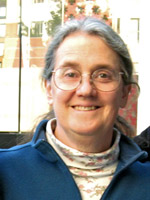
Only Autumn
by Barbara Swift Brauer
Barbara lives in the Lagunitas Creek watershed in the San Geronimo Valley, the last un-dammed headwater tributary of Lagunitas Creek. Her home is within earshot of ephemeral and year-round creeks, just down the road from the fish ladder where coho salmon can be seen along their annual journey upstream to their spawning grounds.

I’m alone in the house
when the footsteps
sound on the deck.
A knock at the front door
startles me from the page.
It’s only autumn.
Acorns plummet
from the lichened branches
the squirrels rain down
green chips of unripe walnuts.
The trees and hills everywhere
begging for rain.
The sun burns hot
but briefer each day.
And I grow hollow
with the shift
as the gathering dark
finds entrance.
It’s only autumn
with its yellow jacket
vehemence,
its special sting.
© Barbara Swift Brauer

Sturgeon
by William Stratton
William resides on the shores of Lake Champlain, nestled between the relatively fast-growing Adirondacks and the much more ancient Green Mountains. Hiking up through a few thousand feet of stone, water, ice and snow of those peaks, he can almost make out where the Lamoille River reaches the bay near his home.

Even in October the wind off the lake
can be cold, real cold like turn your fingers
into dumb dogs and blow right through I
don't care how many shirts you got on.
First slept out here fourteen years ago
right out there in front of the church.
They never kick you out I think God
tells them they have to let you. I'm not
from a place where God spent a lot
of time unless it was on the way to
somewhere else, someplace where
when the people smile it don't scare
you, someplace where everyone has
a dream they can catch and hold
even for a little while. I used to like
to go fishing when I was a boy. When
I first came up here it was to work on
the lake and I thought I could maybe
catch a sturgeon, I hear the lake still
has one or two way down on the bottom.
I lost the job because the foreman hated
black people and I was late on a day when
he hated how black I was. Most people
would have gone back to home, but I
couldn't leave that damned water and then
I started drinking real bad. Now I don't
have no people no more. I think I could
still catch me a sturgeon though, on a day
like this when the sky is the same color
as its scales and no one wants to be out
on the water because it's too dangerous.
That's the secret, see. It's the wind. The
real big ones wait for the goddamned
wind and then they come right out from
the bottom. The goddamned wind.
© William Stratton
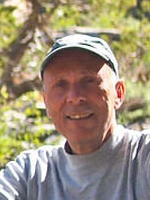
Dendrology
by Robert Ronnow
Bob lives in the Hoosic River watershed, a tributary of the Hudson River. He observes streams hurrying or hesitating toward the Hoosic, and an occasional black bear, porcupine, barred owl or pileated woodpecker, during his morning rambles in the Taconic Mountains.

Surveying
northern autumn afternoon
Pitcherelli, ex-marine, body-builder,
Lussier, long-haired father of three dark-skinned children
and myself, sharp-edged loner, ex-lover of a fair share of
women
are belly-laughing in the dying sun. Clouds.
The crew, among trees.
Laughing
over recent visits to marvelous cities where
we could not keep ourselves from touching the terminal
buds
of numerous exotic trees
and attracting ridicule of stylish girls and tame boyfriends.
Pitcherelli before the Albany bus station
shaking hands with a red pine planted thirty years ago.
Lussier, one hand in a child's hand and the other
feeling scabrous bark of urban woody plants.
Myself among partially shaved heads and leathery aromatic jackets
getting close to the hairy bud of an unidentified poplar or sycamore.
People
laughed, but we laughed best
back on our mountain
under the blackening weather.
© Robert Ronnow

Erosion Librarian
by Daniel Solomon
Danny grew up in the Middle Potomac Watershed. Currently he lives at a similar latitude among the redwoods of California's Coastal Range, where the rain and fog feed the San Francisco Bay.

the wind doesn't hear you speak.
your vibrations are wiped from your mouth
like foam spread on ripples,
fluid on surfaces unseen.
you can teach this nothing.
you can take no lessons.
high up, you can read no text.
but granite boulders fissure along programs.
there are signs in the stones. sheets snapped off at faults,
at misapprehensions in the cleaving of their crystals.
they make for thick,
one-page volumes you can pull from the rock, from shelves
eighty-seven hundred feet tall, black-&-white or pink.
juniper has grown around the boulders,
smothered one in the muscles of its trunk,
poured its dead heart-wood into the gaps
like magma lurching from quartzite – life
insisting on itself on the basis of soil from
its own sheddings, sand prepared by lichens,
by stone grinding on stone, by the sky.
this tree is built from air
& sunlight only.
it has a throat that searches the mountain.
it drinks very little.
it has hands that
hook into the earth,
hook against the mouth of the wind,
& the cold, high sea
that chews on stone,
& laps at the outer spaces
& does not speak.
junipers have roots that page like thumbs through granite leaves.
you have words that rattle air into hymns, into hums,
words you won't write, trees won't read.
© Daniel Solomon

Ancient Forms
(Spirit Lake, Iowa)
by Ann Struthers
Ann Struthers lives in the Indian Creek watershed in Cedar Rapids, Iowa, where the Cedar River eventually runs into the Mississippi. The Iowa legislature is currently attempting to undo or thwart environmental rules protecting the state's water.

Cruising the lake this morning, the great blue heron
fishes, tips his beak, swallows, lifts his great wings, flaps
off,
his pterodactyl head and neck leading him. Small waves
lick the shore, withdraw, lick again. Sugar white sand
here at the north end of the lake, twinned at the south
where one of the millipede feet of the mile-high glacier
halted after kicking up high moraines, east, west.
The millionaire down the way hired a yellow cat with a big
claw
to make a flat beach and 70 red Macs to carry away the
glacier’s mistake.
No regard for 25 oaks, hidden lady slippers, Ogala pottery shards.
I sit on the porch, letting nature be, sipping my coffee,
comforted by the blue shadows writing genealogy on the shore.
I, too, evolutionary, once a bird, before that, a fish,
faint memory of fetal gills closing before my birth.
© Ann Struthers